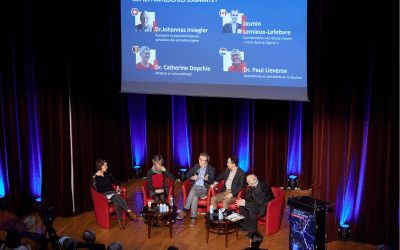On Thursday, July 21, the European Court for Human Rights (ECHR) condemned France for having refused registering civil status documents for birth certificates of children born abroad by surrogacy.
This decision concerns the Foulon and Bouvet files, where men employed recourse to surrogate mothers in India.
In two similar cases in 2013, the Cassation Court validated the refusal by the Rennes Court of Appeal, to recognize birth acts established in India,. The Court of Cassation considered that as the birth was the culmination of fraud to the law, since surrogacy is banned in France, the refusal to register foreign civil status acts was justified.
Didier Foulon and Philippe Bouvet then introduced a request before the ECHR in January 2014.
The court judged today that refusing to register constitutes a violation of rights with respect to the private life of children, guaranteed by article 8 of the ECHR. Furthermore, it condemns the State to pay 5,000 € to each child concerned for “moral damage” and 15,000 to each family for legal costs. However, the European magistrates did not uphold the claimant’s demand for violation of respecting the family’s rights.
In November 2015, “to finish with the contentious affairs » whereby France was being held in contempt before the ECHR, the French government, with the Minister of Foreign Affairs serving as an intermediary, proposed 30,000 € compensation to each of the two sponsors of surrogacy; who subsequently refused.
The Foulon Case: a little girl was born in 2009 in a clinic specialized in surrogacy in Mumbai. Her birth certificate indicated that her mother was unemployed, born in 1980, and her father was Didier Foulon. One month after birth, by written document, Didier Foulon declared having given the surrogate mother 100,000 rupees (approximately 1300 €) corresponding to 3 months wages; as well as 60,000 rupees to the clinic.
The sponsoring father wanted France to register the civil status corresponding to the birth certificate established in India. The procurer of the Republic in Nantes was opposed, under the suspicion that having recourse to surrogacy, banned by the Civil Code’s article 16-7, and whereby “all conventions for the procreation or surrogacy for others is invalidated”.
The man then filed at the High Court of Appeal in Nantes who was granted his request. The prosecution subsequently filed an appeal, and the Court in Rennes revoked its decision, cancelling their decision, by specifying that “it’s not only a monetary affair of a contract between a surrogate mother banned by French law, but the purchase of a child, and therefore inherently against the laws of public order. Following that, the Court of Cassation also dismissed the appeal.
The Bouvet Case: two twins born in 2010 in the same clinic in Mumbai. The birth certificate indicated that they were born to a young unemployed Indian girl who was born in 1982, and from Philippe Bouvet, a 45-year-old French-man, in a ‘pact’ relationship with a man where they had already started the formalities in order to obtain custody of the twins. Philippe Boucet first broached the procedures at the French Consulate in India so that his sons would be registered in the French civil status registry. Then he encountered opposition from the procurer of the French Republic in Nantes, but the High Court Tribunal of the city accepted his request, before the court of appeal, and a confirmation of the appeals court’s decision, before being stonewalled by the Court of Cassation in September 2013.
Caroline Roux, International Director at Alliance VITA states :
« Children cannot be given away or sold. By their decision, the European Court for Human Rights contributes to importing into France an ultraliberal market for procreation and renders the country impotent to opposition. In addition, this is in opposition to the Indian States efforts to eradicate this practice which exploits the poverty of women in favor of profiting rich countries.”
Tugdual Derville, General Delegate at Alliance VITA states:
“We are confronted with a typical example of Human Rights biting its own tail. By pushing their conception of “respect of private life”, to extremes, the European magistrates are sanctioning France to pay individuals who have not only conscientiously committed fraud against our foreign laws, but who have also submitted women and children to abuse in its original form.
While there is no formal penalization for the purchase of human beings outside of French borders, this traffic is permitted even if it is not encouraged. Therefore, in the future, we need a courageous majority to contest not only the emotion that the sponsors feel for the children that they have manufactured, and then imported, but to contest the inacceptable abuse intrinsic in surrogacy practices”.



